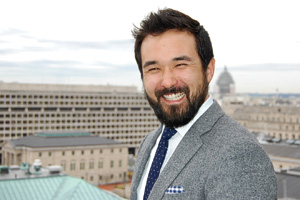March 25, 2016

David K. Visi ('10, '15 Ph.D.) (Photo courtesy of the National Academy of Sciences)
David K. Visi ('10, '15 Ph.D.) is advancing the study of science and microbiology through an unusual petri dish -- the U.S. Congress. Visi earned three degrees from UNT -- bachelor's degrees in philosophy and biology and a Ph.D. in molecular biology and microbiology -- but instead of moving into a traditional science career, he's working as the 2015-16 Congressional Science Fellow sponsored by the American Society for Microbiology and American Association for the Advancement of Science. He advises Rep. Louise M. Slaughter of New York on matters of science and technology.
"I focus on areas Rep. Slaughter is particularly interested in, health care and agriculture," Visi says. "One area where I help guide policy is within the president's Precision Medicine Initiative and the implications it has with her signature bill, the Genetic Information Nondiscrimination Act. With my background, I'm in a good position to understand the intricacies and contribute an empirically and scientifically based view to the conversation."
As a student at UNT, Visi worked in the labs of Michael S. Allen on an interdisciplinary project with professors Nandika D'Souza and Brian Ayre. He studied the microbial constituents of kenaf, a fibrous plant that shows a strong potential for use as an environmentally friendly biocomposite. He was selected as the 2015 Christine Mirzayan Science and Technology Policy Fellow at the National Academy of Sciences, where he worked on the Board on Science, Technology and Economic Policy.
His work in Congress gives him the opportunity to offer a helping hand to scientists all over the nation, and he says legislative matters are an area in which all scientists need to become more involved.
"Positions in science policy give an opportunity to graduate students in the sciences to pursue a different route," he says. "You're involved with the science and helping enact real change that will affect everyone. Appropriations and the budget are dry subjects, but these are things universities and researchers have to be aware of. If there's a cut in research funding, that's going to affect researchers and universities."